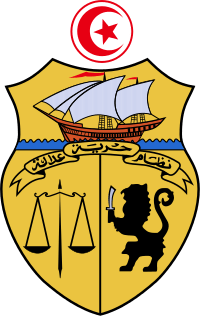Jebali Cabinet
The first cabinet of Tunisian Head of Government Hamadi Jebali was presented on 20 December 2011.[1] Jebali has been appointed by interim President Moncef Marzouki, who had been elected by the National Constituent Assembly, a body constituted to draft a new constitution after the Tunisian Revolution and the fall of former President Zine El Abidine Ben Ali in Spring 2011. It took office on 24 December 2011. The three parties in the "Troika" coalition are the Islamist Ennahda Movement, the centre-left secularist Congress for the Republic (CPR), and the social democratic Democratic Forum for Labour and Liberties (Ettakatol).
| Hamadi Jebali Cabinet | |
|---|---|
Cabinet of Tunisia | |
 | |
| Date formed | December 24, 2011 |
| Date dissolved | March 14, 2013 |
| People and organisations | |
| Head of state | Moncef Marzouki (CPR) |
| Head of government | Hamadi Jebali (Ennahda) |
| No. of ministers | 30 |
| Member parties | Ennahda, Ettakatol, CPR ("Troika") |
| Status in legislature | coalition government |
| History | |
| Election(s) | 2011 Constituent Assembly election |
| Legislature term(s) | Constituent Assembly (2011–2014) |
| Predecessor | Caid Essebsi Cabinet (2011) |
| Successor | Laarayedh Cabinet (2013–14) |
 |
|---|
| This article is part of a series on the politics and government of Tunisia |
|
|
|
Judiciary |
|
Administrative divisions |
|
|
|
|
Cabinet members
The Jebali government consisted of the Prime Minister, four deputy prime ministers, 25 ministers and six state secretaries.[2][3]
| Office | Name | Party | |
|---|---|---|---|
| Head of Government | Hamadi Jebali | Ennahda | |
| Deputy Prime Minister for Transparency and Fighting Corruption | Abderrahman Ladgham | Ettakatol | |
| Deputy Prime Minister for Administrative Reform | Mohamed Abbou | CPR | |
| Deputy Prime Minister for Economy | Ridha Saidi | Ennahda | |
| Deputy Prime Minister for Relations with the Constituent Assembly | Abderrazak Kilani | Independent | |
| Minister of Defence | Abdelkarim Zbidi | Independent | |
| Minister of Justice | Noureddine Bhiri | Ennahda | |
| Minister of Interior | Ali Laarayedh | Ennahda | |
| Minister of Foreign Affairs | Rafik Abdessalem | Ennahda | |
| Minister of Religious Affairs | Nourredine Khadmi | Independent | |
| Minister of Human Rights and Transitional Justice and Spokesperson of the Government |
Samir Dilou | Ennahda | |
| Minister of Tourism | Elyes Fakhfakh | Ettakatol | |
| Minister of Education | Abdellatif Abid | Ettakatol | |
| Minister of Public Health | Abdellatif Mekki | Ennahda | |
| Minister of Training and Employment | Abdelwaheb Maatar | CPR | |
| Minister of Transport | Abdelkarim Harouni | Ennahda | |
| Minister of Communication Technologies | Mongi Marzouk | Independent | |
| Minister of Industry and Commerce | Mohamed Lamine Chakhari | Ennahda | |
| Minister of Investment and International Cooperation | Riadh Bettaieb | Ennahda | |
| Minister of Equipment and Housing | Mohamed Salmane | Ennahda | |
| Minister of Finance | Houcine Dimassi | Ettakatol | |
| Minister of Planning and Regional Development | Jamel Eddine Gharbi | Ennahda | |
| Minister of Youth and Sports | Tarak Dhiab | Independent | |
| Minister of Culture | Mehdi Mabrouk | Independent | |
| Minister of Women’s Affairs | Sihem Badi | CPR | |
| Minister of Higher Education | Moncef Ben Salem | Ennahda | |
| Minister of Social Affairs | Khalil Zaouia | Ettakatol | |
| Minister of State Property and Real Estate Affairs | Slim Ben Hamidene | CPR | |
| Minister of Agriculture | Mohamed Ben Salem | Ennahda | |
| Minister of Environment | Memia Benna | Independent | |
References
- "Tunisian PM presents new government". AFP. 20 December 2011. Archived from the original on 26 February 2014. Retrieved 11 November 2014.
- "Composition du gouvernement". Tunisia-live.net. 22 December 2011. Archived from the original on 1 January 2014. Retrieved 11 November 2014.
- "Tunisia: New Government". Government of Tunisia. Archived from the original on 14 June 2012. Retrieved 11 November 2014.